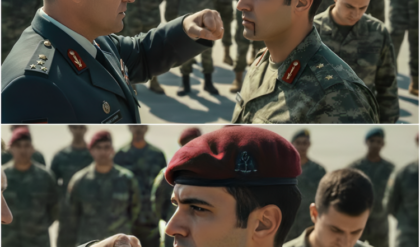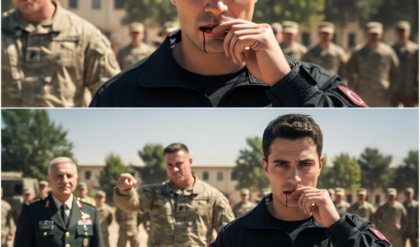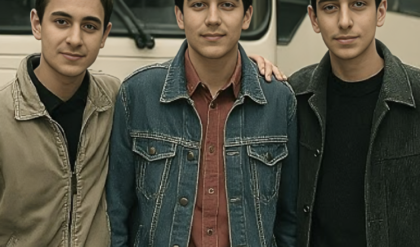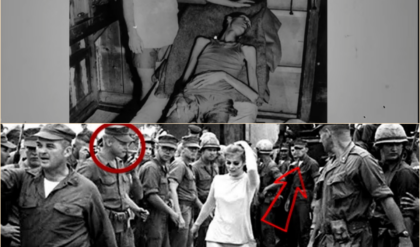THE HOUSE BY THE SEA – Part I
The phone rang just after dawn. Caroline Mercer had been pruning her roses when she heard it — that old landline she refused to replace because its ring carried the echo of another life.
“Mrs. Mercer?” The voice on the line was calm, precise — the kind of calm people use when they’re about to fracture someone else’s world. “This is David Lauren. I’m… I was your son Michael’s attorney.”
Caroline straightened slowly, pruning shears trembling in her hand. The morning was bright and ordinary — birds chirping, her coffee still steaming on the porch — and yet something inside her turned cold.
“What’s happened?” she asked, though part of her already knew.
“There’s been an accident,” David said. “A boating accident off the Mendocino coast. I’m afraid Michael and his wife… didn’t make it.”
The shears slipped from her hand and struck the soil. For a moment, the sound of waves crashing hundreds of miles away seemed to reach her from the phone itself.
When the call ended, she sat on the porch steps, the receiver hanging loose by her side. Her roses swayed in the morning breeze, drops of dew glinting like tears. The world didn’t stop. Cars still passed, birds still sang, and yet everything she knew had quietly collapsed inward.
Grief, she would later learn, doesn’t rush in like a storm. It seeps. It crawls under the skin and stays there, reshaping you.
The Envelope
Three days later, Caroline drove into Portland to meet David Lauren. His office smelled of cedar and rain — the expensive kind of silence that fills law firms.
He handed her a manila envelope with a single key attached. The handwriting on the front made her chest tighten.
For Mom.
David said, “Michael wanted you to have the Mendocino property. His will was clear about that.”
Caroline blinked. “The house he never let me see?”
He nodded gently. “He said you’d understand once you went there.”
Understand what? That question followed her home, whispered through the quiet house like a ghost. She couldn’t sleep that night. She sat at her kitchen table, turning the key over in her palm — a small, cold piece of metal that seemed to weigh as much as her entire life.
For five years, she’d accepted her son’s excuses — not yet, Mom, the renovations are still a mess. Holidays came and went. Birthdays passed in polite phone calls. She’d blamed herself, thinking maybe she’d been overbearing after his marriage to Sophie.
But now she saw the distance differently. There had been purpose behind it — a secret wrapped in silence.
And now the key was asking her to open it.
The Drive
She left before sunrise. Her old Subaru hummed down the Pacific Coast Highway, the ocean stretching endlessly beside her. The mist rolled across the cliffs, soft and white, and every curve of the road seemed to pull her deeper into memory.
She remembered Michael at ten, holding up a sand dollar with that same spark of discovery that would one day make him a doctor.
She remembered the first time he told her he wanted to heal children — his voice trembling with that strange mix of fear and conviction.
“Hope is the only thing that doesn’t run out, Mom,” he’d said.
Now, hope felt like a foreign word.
The radio played static most of the way. When it cleared, an old jazz station slipped through, and for a moment, Caroline let herself imagine Michael somewhere in that music — laughing, driving too fast, teasing her about her old-fashioned taste.
By the time she reached Mendocino, the clouds had started to break. The sea glittered silver beneath a pale sun. Then she saw it — the house.
White walls. Large glass windows. Perched right on the edge of the cliff, like it had been placed there to watch the world end.
She parked and stepped out. The air smelled of salt and lavender. No sign of construction — no hammers, no scaffolding, no half-painted walls. Only the wind and the waves below.
She hesitated at the door, key trembling in her hand. Then, slowly, she turned it.
The lock clicked. The door swung open.
The House
The air inside was cold and faintly chemical — the sterile tang of a hospital corridor. Her footsteps echoed on spotless floors. Everything gleamed: the kitchen counters, the glass tables, the white couches aligned with mathematical precision.
It wasn’t a home. It was a stage set waiting for its actors.
She moved down the hallway. The rooms were immaculate — almost lifeless. Then she reached one door that didn’t fit the pattern.
Behind it, she found what looked like a small hospital ward. Six narrow beds lined against the wall, machines still humming faintly. IV poles stood waiting, monitors blinking. On the walls — drawings. Crayon stick figures with big smiles and blue skies. Children’s names written in uneven letters: Emma. Jonah. Harper.
Caroline pressed her hand to her mouth.
“What is this, Michael?” she whispered.
In another room, shelves held medical files and vials labeled with numbers. She opened one folder — it contained a photograph of a girl, maybe eight, with bright eyes and a shaved head. The name: Grace.
At the bottom of the file:
Protocol 7. 73% Positive Response.
Her knees weakened. She sat down at the desk and flipped through more pages — treatment records, parent signatures, letters of gratitude. One read:
“Dr. Mercer, thank you for giving Emma another summer. We’ll keep quiet like you asked. Whatever happens, you gave us hope.”
The word quiet burned through her chest. This had been no ordinary clinic.
It had been a secret one.
The Video
In the bottom drawer, she found a flash drive. Her hands shook as she plugged it into the computer. A video appeared — her son’s face, older, tired, and shadowed by sleeplessness.
“Mom,” he began softly. “If you’re seeing this, it means things didn’t go the way we hoped.”
He looked around the room — the very one she was sitting in.
“This place isn’t just a house. It’s hope for kids nobody else would treat. But we’re running out of time. Promise me you’ll look after them. Even if you can’t save me, save them.”
The screen went black.
Caroline sat frozen, staring at her own reflection on the monitor. Her son had been alive in that screen — for just a few seconds — and then gone again.
Tears blurred her vision. For the first time since the funeral, she cried — deep, wracking sobs that came from a place grief couldn’t reach.
He hadn’t been avoiding her. He’d been protecting her.
The Visitors
The next morning, she returned with gloves and a notebook. She was determined to understand every inch of that house. Everything felt too deliberate — the labeled medicines, the clean floors, even the coffee cups washed and stored upside down.
Someone had left with purpose, not panic.
As the fog thickened outside, she explored the lower floor — the lab. A cold room filled with glass equipment and refrigeration units. She found another locked drawer. The same key fit perfectly. Inside were photos — children smiling with Michael and Sophie, some mid-recovery, others holding balloons.
Then headlights flared across the window.
Caroline froze. Tires crunched on gravel. Voices murmured outside.
Three figures approached the front door. A beep sounded — a keypad code she hadn’t noticed before. The door opened.
“Hello?” she said, her voice shaking.
The woman in front stopped, startled. She wore scrubs under a gray jacket.
“You must be Caroline,” she said quietly. “Michael’s mother.”
Behind her stood a tall man with a stethoscope and a younger assistant carrying a medical case.
“I’m Dr. Lena Morales,” the woman continued. “This is Dr. James Porter, and that’s Noah. We didn’t expect anyone here yet.”
Caroline’s heart pounded. “What was this place?” she asked.
Lena exchanged a look with James. Then, softly, “A sanctuary. For children whose hospitals gave up on them. We ran it off the grid — no insurance, no politics.”
James added, “Your son saved sixty-three lives, Mrs. Mercer. But the authorities called it illegal experimentation.”
Caroline stared at the empty beds, the drawings, the silent machines.
“Illegal?” she whispered. “Saving children was illegal?”
No one answered.
Lena took a breath. “Four children are still here, in the guest house behind the lab. We’re keeping them stable, but without the compound Sophie was making…” She trailed off. “They won’t last long.”
Caroline pressed a trembling hand to her lips. She had come here to mourn her son, not to inherit his war. And yet here it was — breathing through the walls, pulsing in every heartbeat of that house.
The Decision
That night, the wind howled through the cliffside. Caroline couldn’t sleep. She sat at the kitchen table surrounded by files, letters, and her son’s notes — fragments of his devotion scattered like confessions.
Lena joined her with two mugs of coffee. “We can’t stay here long,” she said. “Once the estate’s traced, they’ll come for everything. The research, the children — all of it.”
Caroline looked at her, a flicker of something fierce in her eyes. “Then we don’t wait. We finish what he started.”
Lena studied her in silence. “You sound like him.”
“I’m his mother,” Caroline said simply. “He didn’t build this for it to die.”
In that moment, something in her changed. The grief that had hollowed her out began to reshape itself into resolve.
When she finally lay down, the ocean below the cliffs no longer sounded like mourning. It sounded like warning — and promise.




